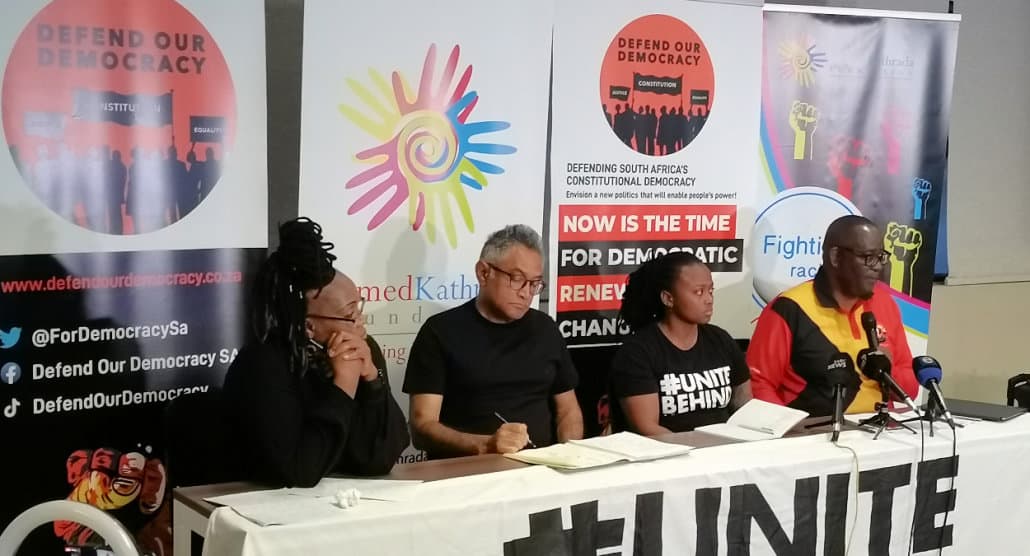By Kwazi Dlamini
Martha Ngoye has decried President Cyril Ramaphosa’s promise to protect whistle-blowers in South Africa, saying it does nothing to make those who decide to do right feel safe and protected. Ngoye, group head of the legal department of the Passenger Rail Agency of South Africa (Prasa), is currently on suspension pending the outcome of a disciplinary process brought against her for blowing the whistle on corruption at the rail agency.
She was speaking on 25 August at a media and civil society briefing organised by #UniteBehind, Defend Our Democracy and the Ahmed Kathrada Foundation. The event took place just before the Supreme Court hearing the next day on the Prasa v Siyangena Technologies case .
Ngoye spoke about the extent of state capture at Prasa, and also shared her experience as a whistle-blower. She and other executives at Prasa exposed and took a stand against irregular multi-billion-rand Swifambo and Siyangena contracts. Ngoye also gave evidence at the Zondo commission on the state of Prasa, actions that consequently led to her suspension and threats to her life.
Ngoye said that during Babita Deokaran’s memorial service, held recently in honour of the slain whistle-blower who lost her life a year before, a friend told her that she is under surveillance. She spoke of fears that she might be met with a similar fate, but stated that as she is an attorney and a professional driven by ethics, she has to do her job even if it means putting her life at risk.
“I do not have any protection and never had one. There have been threats within Prasa going as far as saying that the legal department thinks they run the enterprise. Some days I am scared for my life because of what happened to Babita Deokaran, because even when the president emphasised the importance of protecting whistle-blowers, that protection does not exist,” said Ngoye.
General secretary of the South African Federation of Trade Unions Zwelinzima Vavi also criticised the government for its failure to protect whistle-blowers. Vavi described Ramaphosa as saying nice things about whistle-blowers and singing their praises for the risk they shoulder for the country – but with stories of threats and victimisation coming up daily, he labelled the non-action as a form of betrayal to whistle-blowers.
Tender processes not followed
In 2020 the North Gauteng High Court set aside irregular contracts between Prasa and Siyangena Technologies, worth around R6-billion. Siyangena scored the contracts to provide Prasa with security, information boards, CCTV, lights and communication systems, and automated access gates for the 2010 World Cup. The supplier has not fulfilled the contracts.
Ngoye said that the contracts worth approximately R6-billion did not follow tender processes and after requesting a review of the contracts between the two parties, they called for an investigation with the Public Protector.
The Public Protector found that the contracts between Prasa and Siyangena did indeed constitute improper conduct. Siyangena took the matter to court in an attempt to demand outstanding payment from the state-owned entity, but in its judgment the High Court ruled that the supplier was complicit in the corruption, impropriety and maladministration ravaging Prasa.
The court ordered Siyangena to pay the costs of the application. However, according to #UniteBehind, a civil society coalition, despite Prasa emerging victorious at the High Court, its management tried to settle the case, contradicting a legal opinion warning against such action.
The court further ordered that an independent engineer be appointed to evaluate the cost of the work Siyangena did for Prasa as the company should not have profited in any way from the irregular contracts.
Siyangena wasted no time in approaching the Supreme Court of Appeal. #UniteBehind, as part of its #FixOurTrains campaign, joined the case as amicus curiae, with the aim of ensuring that the Siyangena appeal is properly defended. The organisation said it would argue that Siyangena should not be allowed to profit whatsoever from illegality and corruption.
The activist group has been at loggerheads with Prasa and transport minister Fikile Mbalula, trying to compel them to recoup the money already paid to Siyangena.
Ngoye revealed that her stance on the matter has made her enemy number one at Prasa but she maintains her support for any legal process and civil society efforts to ensure that those who irregularly benefited from contracts pay back the money.

